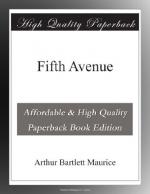As became his day, Hone was a good trencherman. In the index to the Diary there are one hundred and sixteen pages marked as containing reference of some kind to dinner parties. The old New York names appear again and again. H. Brevoort, Chancellor and Mrs. Kent, Mr. and Mrs. W.B. Astor, Bishop Hobart, C. Brugiere and Miss Brugiere, Robert Maitland, Dr. Wainwright, Mr. and Mrs. Anthon, Judge Spencer, Judge Irving, Dr. Hosack, Peter Jay, P. Schemerhorn. And only the formal dinner parties are indexed. Aside from them there are scores of allusions to where the diarist dined and who dined with him. Small wonder that the passing of a cook of unusual abilities was an event to be recorded. An early entry, that of February 17, 1829, reads: “Died this morning, Simon, the celebrated cook. He was a respectable man, who has for many years been the fashionable cook in New York, and his loss will be felt on all occasions of large dinner and evening parties, unless it should be found that some suitable shoulders should be ready to receive the mantle of this distinguished cuisinier.” When Hone was not entertaining at his own home or being entertained at somebody else’s, he was trying out the fare at some one of the public hostelries. Date of December 18, 1830, there is reference to a familiar name. “Moore, Giraud, and I went yesterday to dine at Delmonico’s, a French restaurateur, in William Street, which I had heard was on the Parisian plan, and very good. We satisfied our curiosity, but not our appetites.”
We are prone to regard the Civil War as an affair of the sixties. Hone was one of those who perceived the threat of it thirty years before. Always a bitter political opponent of Jackson, there was one occasion when he was loud in his applause. The South Carolina Convention had passed a number of resolutions regarded by Hone as rank treason, and the beginning of rebellion. The President had dealt with the matter in a proclamation, of which the diarist wrote December 12, 1832: “Very much to the surprise of some, and to the satisfaction of all our citizens, we have a long proclamation of President Jackson, which was published in Washington on the 12th. inst., and is in all our papers this day. It is a document addressed to the nullifiers of South Carolina, occasioned by the late treasonable proceedings of their convention. The whole subject is discussed in a spirit of conciliation, but with firmness and decision, and a determination to put down the wicked attempt to resist the laws. On the constitutionality of the laws which the nullifiers object to, and their right to recede from the Union, this able State paper is full and conclusive. The language of the President is that of a father addressing his wayward children, but determined to punish with the utmost severity the first open act of insubordination. As a composition it is splendid, and will take its place in the archives of our country, and will dwell in the memories of our citizens alongside




